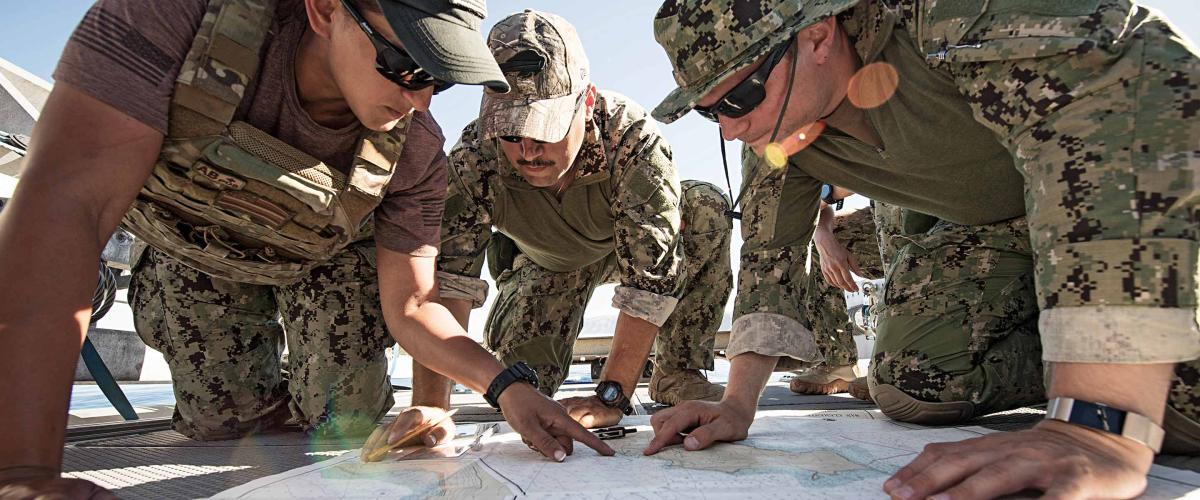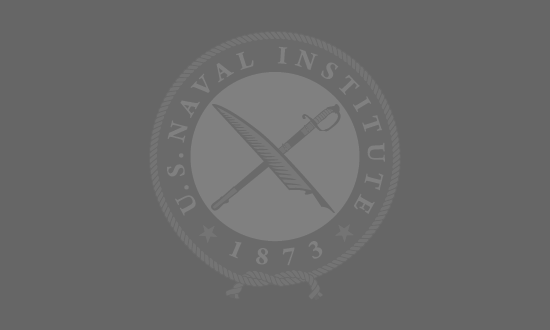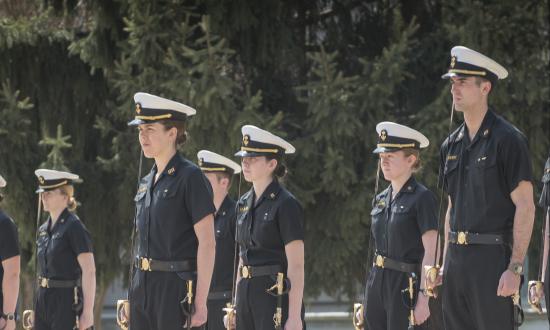“He who knows no foreign languages knows nothing of his own.”
—Johann Wolfgang von Goethe
Service members fluent in foreign languages are becoming more valuable to the Department of Defense. While a few members of the Navy’s information warfare community (IWC) already are proficient in them, the IWC broadly lacks language capabilities and is under-invested in routinely training its members in particularly useful languages. This deficiency creates issues in information exchange with allies and a void in the deeper understanding of adversaries and competitors. To improve the situation, the Navy can make a number of relatively low-cost, high-yield investments in foreign language proficiency: funding and enrolling more IWC sailors in DoD language schools, paying for commercially available language services to sustain more sailors, and employing fluent speakers to help teach foreign languages to other IWC sailors. Eventually, the IWC should link foreign language proficiency to some of its members’ professional knowledge and enable language competency to count toward promotion and advancement, paving the way toward a multilingual fleet.
As information operations become a well-honed weapon in the adversary’s arsenal, DoD fiscal constraints will require more of an already outsized use of allies. And the United States may soon start to feel the effects of other nations’ decreasing willingness to learn English. Reports from China suggest the Chinese government is moving away from teaching English in its public schools.
Foreign language proficiency is integral to IWC operations. Sailors’ ability to comprehend, interpret, and interact with U.S. allies and adversaries in the interlocutor’s native tongue can significantly augment battlespace awareness, integrated (nonkinetic) fires, and overall understanding of the enemy. But communication is not the only benefit of foreign language proficiency. Fluency is key to understanding cultural nuances and historical context within partnerships and conflicts. Linguistics is often critical to the meaning and understanding of a governments’ true intention and motivation or political posturing, hyperbole, or sarcasm, as well as context for historical conflicts and treaties. The nature of the competition in which the United States is engaged necessitates better understanding of these things to assist allies and combat adversaries.
Not every element of information warfare benefits equally, however. Meteorological and oceanography officers, aerographer’s mates, information professionals, and information systems technicians are probably better served emphasizing science, technology, engineering, and mathematics technical skills. For intelligence and cryptologic warfare officers and enlisted sailors, however, the potential benefits are quite clear. Whether through interpersonal communication, literature, publications, and manuals, foreign interaction has become routine.
The Navy already invests heavily in education and skills development for the IWC, but adding an emphasis on foreign language proficiency need not be too financially burdensome. One first step—which would require only a small additional investment—would be to require all IWC officer designators and enlisted ratings take the Defense Language Aptitude Battery (DLAB) before qualifying as information warfare officers/specialists. Adding the DLAB to the 300-level tasks of the qualification process will attract interested parties and reveal which IWC sailors come to the career field already possessing foreign language aptitude. Some will lack it entirely, but the DLAB can suggest which sailors would excel most at specific languages.
Enrolling those who performed well on the DLAB in DoD language schools will generate improved IWC language proficiency and deepen the Navy’s ability to employ soft power. The Government Accountability Office notes that the DoD “obligated over $6.8 billion from fiscal years 2008 through 2012 on contracts to acquire a variety of foreign language translation and interpretation support needed to carry out diverse missions and operations both within and outside of the United States.” Some of those billions of dollars could be devoted to teaching languages to more IWC sailors or expanding the Navy’s language-coded billets to free up additional enrollment opportunities. This would enable cleared officer designators and enlisted ratings in the IWC to stack their job skills while maintaining the integrity of information operations, vice separately vetting and contracting foreign nationals or native speakers to provide translation services.
The Defense Language Institute Foreign Language Center (DLIFLC) in Monterey, California, and Washington, DC, offers 16 foreign languages and dialects in courses of instruction lasting from less than a year to up to two years. The infrastructure already exists but needs the right emphasis and retooling for inclusion of more of the IWC. The cryptologic technician interpretive (CTI) enlisted ratings and some IWC officer designators already attend DLIFLC, but, without an assessment of how many matriculate or how the Navy codes IWC language billets, their value may go unrealized and unrecognized.
Consider, for example, that the Naval Postgraduate School’s (NPS) National Security Affairs, Regional Security Studies Curricula allows for officers to receive language training at DLIFLC. However, the Navy requires them to be immediately transitioning to a language-coded billet after completion. This eliminates a priori almost every naval officer except foreign area officers (FAOs). Why not let IWC officers already attending NPS (or the National Intelligence University in Washington or the Naval War College in Newport, Rhode Island) supplement their professional military education with foreign language study while already in an academic assignment?
IWC sailors should likewise have a chance to opt into language training while on shore duty, at a service school, or in a non-degree-seeking program. If too much non-observed fitness-report and evaluation time is of concern, officer language training could shift to post-milestone completion, and sailors could take it while still junior enough to absorb non-observed time. If levels of proficiency present a challenge under the Defense Language Proficiency Test (DLPT), structure results as complete/incomplete, similar to how the Navy funds non-degree-seeking college admissions for other continuing education opportunities. But broadening special pay for those who score high enough would give incentives to do more than merely complete the program. For enlisted sailors, cross-train IWC rates with other armed services’ enlisted language programs or let the sailor’s opt-in include orders to DLIFLC.
Another opportunity is to fund attendance at local universities and community colleges that offer language classes. The IWC should remove barriers (such as limitations across fiscal years or limits tied to training budgets) for commands to organizationally fund sailors to complete language training in a non-degree-seeking status. In conjunction, refine the designation of language-coded billets. The Navy could create a tiered-language-coded-billet (TLCB) approach based on the assessed need for language competency in a specific billet. The highest tiers would require full-time enrollment at DLIFLC, while lower-tiered ones would allow for a joint-DLI/commercial language curricula, or attendance as a non-degree seeking student at a local college.
A third potential solution lies in employment of fluent speakers already serving within the IWC. If the Navy invests in its IWC sailors’ language proficiency, one way to ensure return on investment would be to employ those experts as language teachers, tutors, coaches, and trainers while on shore duty. Similar to varied performance on the DLAB, not every sailor will be adept at teaching others, but supplementing existing DLIFLC curricula with IWC teaching assistants could enable larger class sizes and/or more efficient courses at DLIFLC.
Partner with the FAO community and employ IWC sailors who have received the highest-tier language instruction. Create additional qualification designators to professionalize the instructor opportunities or enable these sailors to teach languages as a collateral duty. This could serve as shore duty for both officers and enlisted and could enable those already proficient to sustain their fluency while helping others.
To encourage IW professionals to take advantage of all these opportunities, the IWC should make language proficiency part of professional aptitude for some designators and ratings and let it contribute to promotion and advancement. If the Navy desires to use the IWC to its fullest, one way could be to professionalize the learning of foreign languages. Language proficiency should not count more than sustained superior performance, leadership, or management acumen, but if Joint Professional Military Education and college education contribute to officer and enlisted promotion considerations, then language proficiency or language instructor duty should, too.
Potential costs for implementation of these ideas vary, but many can be done with relatively small investments, piggybacking on existing funding or educational assignments. The full costs might be more significant, but China and Russia have increased their capabilities in the information warfare domain. The employment of soft power will become increasingly meaningful in preventing war or ending it quickly.
The IWC must continue to adapt, refine, and invest in its skills. Language proficiency is one relatively low-cost force multiplier that can aid in understanding adversaries and allies. The time is now for the Navy to invest in foreign language training for a greater proportion of the IWC. And, it might be easier than we think. Language proficiency should be considered as valuable to the IWC as navigation principles are to the surface warfare community—the IWC should not become too reliant on high-tech solutions to low-tech issues.





